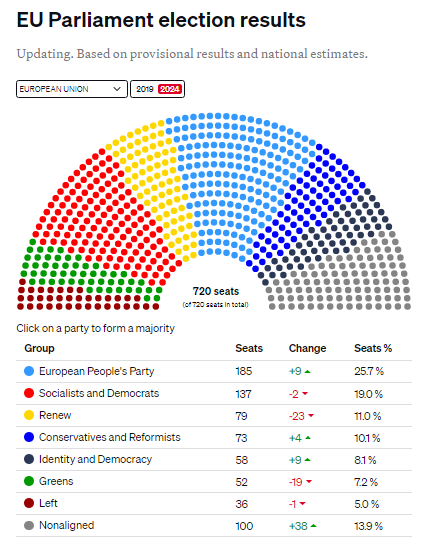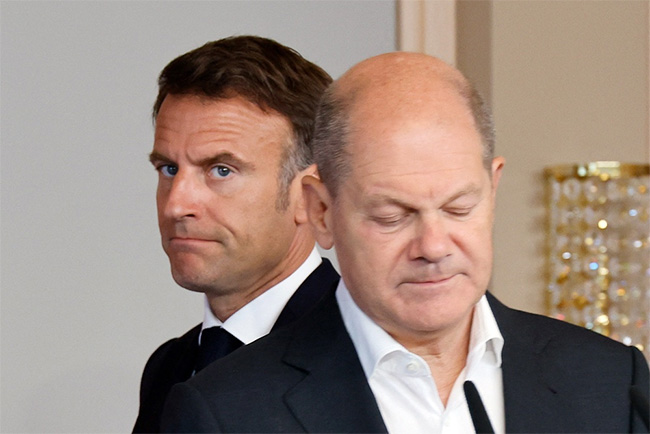
One thing is certain after Sunday’s European Parliament election: Not everybody will be celebrating.
While the right gained in strength, greens and liberals had a rough night. French President Emmanuel Macron took such a beating he immediately dissolved the national parliament and called a new election.
Here’s POLITICO’s guide to who will be bouncing out of bed and who will be waking up to a living nightmare.
Winners
Ursula von der Leyen
The European Commission president emerged from Sunday’s vote with a possible coalition of Socialists, liberals and her own center-right European People’s Party (EPP). Together, these three groups — which supported her during her current term — are expected to have some 407 votes in the chamber.
Though she only needs 361 votes in Parliament to secure a second mandate, the possibility of defections means her victory is not yet a done deal. She will also need the support of the European Union’s national leaders in the European Council.
Still, the EPP is well-positioned to push her through. Manfred Weber, the leader of the EPP, called on German Chancellor Olaf Scholz and France’s Macron to support von der Leyen for five more years. The EPP won in Germany, Spain, Poland, Bulgaria, Slovenia, Lithuania, Luxembourg, Cyprus, Latvia, Estonia, Finland, Croatia and Greece. They also picked up six seats in the Netherlands, outperforming expectations.
Giorgia Meloni
The Italian right-wing leader won the election in Italy, emerging well ahead of her rivals. That makes her, along with Poland’s Donald Tusk, one of the few leaders of a large EU country to romp home with a victory. She appears to have improved on her share of the vote compared to the 2022 election.
The far right
Marine Le Pen’s far-right National Rally victory was the big story of the night after its strong performance impelled Macron to dissolve parliament and call a new election. Far-right parties also came first in Austria, tied for first place in the Netherlands and came in second in Germany and Romania. French firebrand Éric Zemmour’s Reconquest also scraped into Parliament.
Socialists
Well, kinda. While they didn’t exactly dazzle, Europe’s center-left parties held the line, coming in second in big countries like Spain and Italy and in a close third in France, where Raphaël Glucksmann appears to have resurrected the center-left. Don’t mention Germany, though, where Scholz’s Socialists came in a sad third, behind the far-right Alternative for Germany party.
Péter Magyar
An ally-turned-rival of Hungarian Prime Minister Viktor Orbán, Magyar has emerged as the undisputed face of Hungary’s opposition, winning some 30 percent of the vote after throwing his hat into the ring earlier this year.
Roberta Metsola
The Maltese president of the European Parliament got her party an extra seat, having racked up over 87,000 first preferences. Maltese media reported she became the country’s most voted MEP candidate since the country joined the EU.
Losers
Emmanuel Macron
The French president was dealt a blow after his party came in a distant second, barely ahead of the Socialists he was once thought to have consigned to the political graveyard. His lead candidate Valérie Hayer will limp back to Brussels after having been repeatedly upstaged by her male allies, not least by Prime Minister Gabriel Attal. According to a senior official from her Renew party, Attal even barred her from getting on the train from Paris to Brussels on Sunday night.
Olaf Scholz
The German Chancellor’s Social Democrats got crushed by the center-right Christian Democrats and the far-right Alternative for Germany. With just 14 percent of the vote, the SPD received its worst result in a national election in more than a century. Scholz is facing calls from the center-right to do a Macron and call an early election.
Greens
After a strong performance in 2019, the Greens took a thumping in Germany, slipping from 21 seats to perhaps as few as 12, barely clung on in France and got zero in Portugal. Overall they lost some 20 seats in a bleak night for the climate campaigners. Putting on a brave face, one of the party’s lead candidates, Dutch MEP Bas Eickhout, said the Greens will seek to play a “constructive” role in coalition talks — that is, if von der Leyen is interested in talking to them.
Viktor Orbán
The Hungarian nationalist leader did worse than expected, after facing a fierce challenge from Magyar. While his Fidesz party took 43.8 percent of the vote, it was its worst-ever result in a European Parliament election. Still, Brussels will be watching whether he maneuvers his MEPs into the nationalist European Conservatives and Reformists group, giving another boost to Meloni.
Matteo Salvini
The Italian deputy prime minister’s League party, which received 34 percent of the vote in 2019 and currently presides over the far-right Identity and Democracy group, received less than 9 percent this time around, putting it on par with Forza Italia (which ran with the late Silvio Berlusconi’s name on the ballot). Ciao to them.
 Macron and Scholz – the European losers
Macron and Scholz – the European losers
“We’re ready to exercise power,” veteran far-right radical Marine Le Pen declares.
A surge in far-right populism in France provoked President Emmanuel Macron into calling a high-risk national election that could determine the future not only of his country but of the European Union itself, POLITICO notes.
Across the Continent it was a good if unspectacular night for center-right and far-right parties and a terrible one for liberals and especially greens.
But in France, the far-right National Rally, led by Euroskeptic and NATO-skeptic firebrands, completely crushed Macron’s liberal Renaissance and all other contenders.
The National Rally is on course to win 31.5 percent of the vote — more than twice the 14.7 percent projected for Macron’s liberal Renaissance party.
In France, the National Rally’s performance in the upcoming snap election on June 30 and July 7 will be closely watched as a harbinger of whether Le Pen — long the also-ran of French politics — can ride her party’s momentum into the presidency in 2027.
Like Macron, Le Pen suggested France had come to a historical turning point.
“Tonight’s message, including that of dissolution, is also addressed to the leaders of Brussels,” she said. “This great victory for patriotic movements is in line with the direction of history, which is seeing throughout the world the return of nations.”
Macron’s snap decision to dissolve the National Assembly was met with disbelief by his supporters, with several people screaming “Oh no” as he spoke to a crowd in a televised address from his party headquarters in Paris.
In contrast, jubilant supporters of the National Rally party celebrated as Macron announced the dissolution of parliament, something the party had called for as the scale of their victory became apparent.
The lead Socialist candidate Raphaël Glucksmann responded to the triumph of the far right by saying: “Everywhere in Europe, we are witnessing a wave that is shaking our democracy.”
The far-right surge in France was replicated elsewhere in Europe on a dramatic night of upheaval in EU politics. In Berlin, Olaf Scholz’s ruling coalition parties were beaten by the far-right Alternative for Germany (AfD) party, which came second to the conservatives. Far-right parties were also on course to make gains in Austria, the Netherlands, Spain and Italy, according to early estimates.
read more in our Telegram-channel https://t.me/The_International_Affairs

 10:10 11.06.2024 •
10:10 11.06.2024 •






















